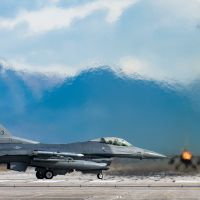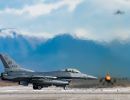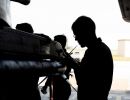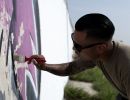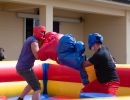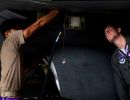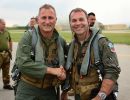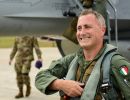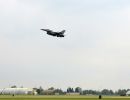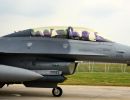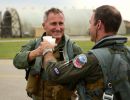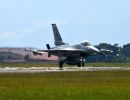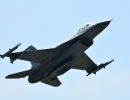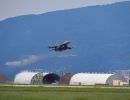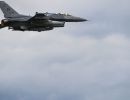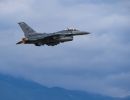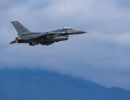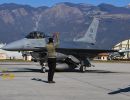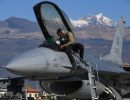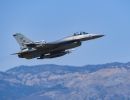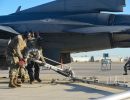Approximately 80 aircraft from 13 countries participated in Operation Determined Falcon, a show of force brought about by bloodshed in Kosovo, the separatist Serbian province wracked by violence. Meant to promote peace and stability in the region, the multinational operation which started on 15 June 1998 called for NATO fighter jets to patrol Yugoslavian borders with Albania and Macedonia. Reconnaissance, airborne warning and tanker aircraft, along with helicopters, participated in the airpower demonstration over Albania and the Former Yugoslav Republic of Macedonia.
In Operation Determined Falcon, 85 aircraft from 13 NATO countries took off from 15 bases across Europe and from carriers in the Adriatic Sea. Support planes and refueling tankers backed up these aircraft. 28 of the aircraft left Aviano Air Base in Italy by 7 a.m. heading first to Macedonia and then to Albania. Jets flew across both countries and edged within 10 miles of the Yugoslav border. The exercise ended at noon. "This is an exercise intended to demonstrate the alliance's commitment to peace and stability in the region and [our] ability to project power into the region," said Lt. Gen. Michael Short, commander of NATO air forces in southern Europe.
Key breaks between NATO and Russia became obvious with regard to the air simulation. Russian defense minister, Marshal Igor Sergeyev, said he had not been informed in advance that NATO would begin its air exercises on Monday. Sergeyev publicly rebuked General Henry H. Shelton, chairman of the U.S. Joint Chiefs of Staff, at a meeting in Moscow. With reporters and cameras present, the Russian said he had met with Shelton and Defense Secretary William S. Cohen at NATO headquarters in Brussels on Friday. "We discussed the Kosovo problem in detail. We all agreed that first of all it was necessary to resolve it with political measures. And as soon as I get back to Moscow I find out the exercises have begun. This was unexpected for me. As a soldier, I am used to valuing honesty in people. I can't understand why they treated me in this way."
In the aftermath of the air show, President Milosevic headed to Moscow for consultations with Russian President Yeltsin, and US and NATO leaders discussed future plans. Defense Secretary William Cohen on Tuesday played down the prospect of a quick NATO military response if Yugoslavia refused to stop its crackdown in Kosovo, saying this would require lengthy consultation. " 'No such decision has been made on the use of any military force," Cohen told a news conference during a visit to Warsaw. "A good deal more deliberation would have to take place within NATO. There is of course some disagreement as to what the legal foundation would be for the exercise of military options if they become necessary and all of us have to consult with our parliaments and congresses."
Disagreements within the U.S. military were also reported. The Washington Post reported, "As top U.S. national security officials threaten the use of military power to resolve the crisis in Kosovo, U.S. military planners have expressed deep misgivings about the amount of force it would take to protect NATO aircraft and force the Yugoslav government to change course in the province." It further stated that "Pentagon officials say they have made it clear to President Clinton's foreign policy advisers that to protect NATO aircraft, any air strike would have to be preceded by an all-out bombardment of Yugoslavia's 60 surface-to-air missile sites and its 241 combat aircraft, a preparatory action that one defense official described as a smaller-scale version of the Desert Storm air campaign."
On Tuesday, the meeting between President Milosevic and President Yeltsin took place. President Milosevic agreed to meet many -- but not all -- of the demands set by NATO and the Contact Group. But Milosevic did not accept the key demand for an immediate withdrawal of Serbian security forces in the southern Serbian province. The joint declaration issued said Belgrade would resolve problems in Kosovo by political means, continue negotiations, carry out no repressive actions against civilians, allow freedom of movement and set no limits on foreign diplomats and international organizations accredited to Yugoslavia. It promised free access for humanitarian organizations, the right for all refugees and displaced persons to return home, state help in rebuilding destroyed homes and added: "In accordance with the stopping of terrorist activities, the security forces will cut back their presence outside bases."
Russian Foreign Minister Yevgeny Primakov hailed Milosevic's concessions as a breakthrough after months of fighting. "'We consider this now opens a real possibility to regulate the situation and the ball is now to a large extent in the Kosovo Albanians' court," Primakov told a news conference. The Russians continued to hold to a separate path than NATO's during this week. Itar-Tass news agency in Russia reported that Defense Ministry's Colonel-General Leonid Ivashov as saying that NATO action in Kosovo without U.N. support "would lead to the start of a new Cold War." His comments marked a new stage in Russia's battle of words with NATO.
The view held by President Milosevic of the offensive in Kosovo seemed radically different than that reported in the press and than that seemingly obvious to all observers. In a defiant press conference in an ornate Russian Foreign Ministry mansion in Moscow, Milosevic denied that Serbian forces had ever harmed ethnic Albanians. "There was no kind of ethnic cleansing," Milosevic said. "In the latest actions it was declared by the security forces there were no civilian victims at all."
While General Wesley Clark said that the success of the exercises demonstrated NATO's "capability to rapidly project power if required," the Serbs continued their offensive in Kosovo. Serb forces matched NATO's show of force Monday with the real thing, attacking four villages in western Kosovo with grenades, helicopter gunships and heavy shelling, ethnic Albanians claimed. The fighting was a sign to many ethnic Albanians that the NATO exercises had angered the Serbs, and that direct intervention was needed to halt the bloodshed.
Yeltsin expressed Russian opposition to a military intervention against Belgrade. The United States declared that a possible NATO intervention would not need UN authorization, a view not supported by Paris and Bonn. NATO could decide to act without a mandate of the UN Security Council, which would risk its fragile relationship with Russia, the Serbs' patron of long standing. France refused to go along with the military action unless the UN Security Council approved, and Russia promised to veto any resolution that authorized it.


